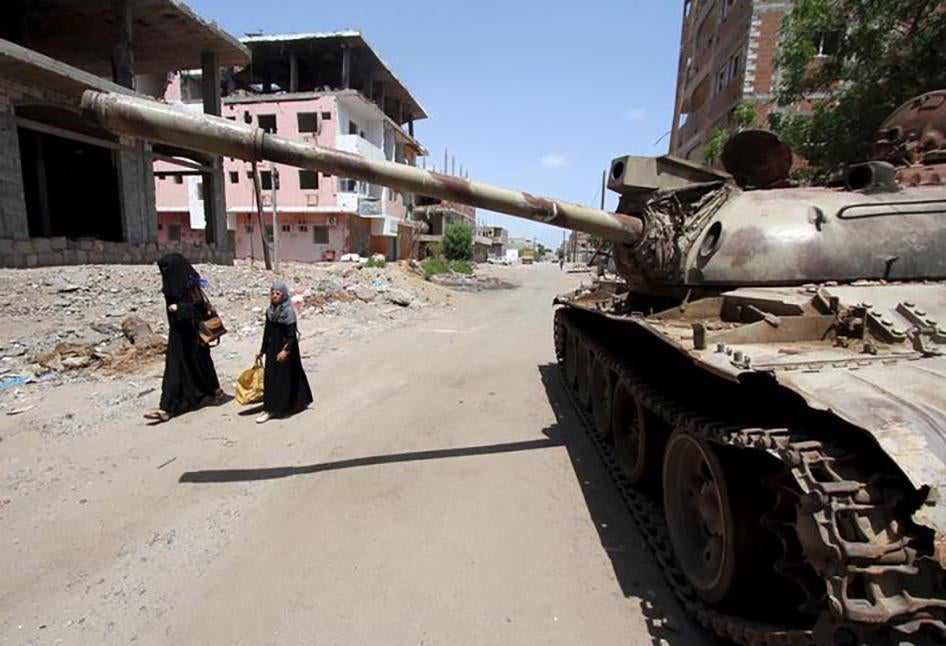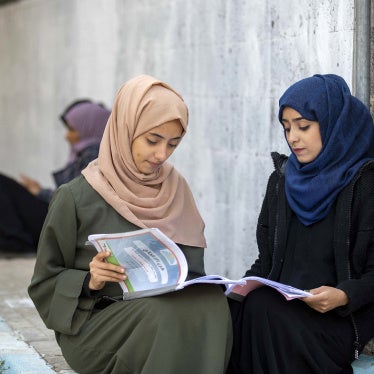(Beirut) – Houthi officials in Yemen have barred a prominent women’s rights advocate from traveling to preparatory peace talk meetings in the region, Human Rights Watch said today. The Houthis, also known as Ansar Allah, should lift all travel restrictions on Dr. Shafiqa al-Wahsh, director of the semi-governmental Women’s National Committee of Yemen, and her colleagues to enable them to take part in dialogues abroad.
Twice in the last month Houthi authorities prevented al-Wahsh from traveling to meetings in preparation for future talks to resolve Yemen’s armed conflict. Despite her leadership role in bringing women’s voices into Yemeni peace negotiations, she was barred from traveling to Jordan and then barred from traveling to Egypt, though her deputy and 15 of her colleagues were allowed to go to the latter meeting. The Houthis cited the security situation in Yemen in rejecting her second request. Al-Wahsh’s work in the Women’s National Committee includes bringing women from all political backgrounds into dialogue and raising awareness of the humanitarian impact of Yemen’s armed conflict on women.
“The Houthi authorities are sending a terrible message by barring women who are trying to bring safety and security to Yemen from leaving the country,” said Sarah Taylor, the women, peace, and security advocate at Human Rights Watch. “Women have a right to participate and an essential role to play in peace talks if the concerns of the whole Yemeni population are to be addressed.”
The International Covenant on Civil and Political Rights, to which Yemen is a party, states that “everyone shall be free to leave any country,” including their own. Restrictions to this right must be provided by law and necessary for reasons of national security or other grounds, but they “must not nullify the principle of liberty of movement” and be consistent with other rights. According to the United Nations Human Rights Committee, any legal restrictions “should use precise criteria and may not confer unfettered discretion.”
On March 26, 2015, a Saudi-led coalition of Arab countries launched an aerial campaign against Houthi and allied forces in Yemen. The Houthis, an armed group from northern Yemen, had earlier gained control of the capital, Sanaa, and other areas, causing President Abdu Rabu Masour Hadi and his cabinet to flee to Saudi Arabia. Since then, the UN and various regional actors have encouraged peace negotiations, though several rounds of talks have failed. The UN special envoy for Yemen, Ismail Ould Cheikh Ahmed, proposed a new round of talks for later in November in Geneva.
The Houthi authorities’ restrictions on al-Wahsh’s travel comes less than a month after 110 countries pledged political and financial support to women affected by war, and reiterated the importance of women’s roles in ending conflict, marking the 15th anniversary of the UN Security Council’s landmark first resolution on women and armed conflict.
Security Council Resolution 1325, adopted in 2000, called for women’s “equal participation and full involvement in all efforts for the maintenance and promotion of peace and security.” In years since, the Security Council passed seven additional resolutions supporting the role of women in achieving and maintaining peace, and security. In October 2015, Ahmed briefed the Security Council on various women from across the political spectrum in Yemen – including al-Wahsh – who had come together to push for a resumption of the peace process.
Recent research shows that women’s meaningful participation in negotiations improves the chances that a peace agreement will last longer. Yemen has already faced the consequences of previous negotiations that did not insist on the principles of justice and accountability for all as its primary focus.
Over recent months the Houthis have shut down human rights and other nongovernmental organizations, and arbitrarily arrested members of these groups. Human Rights Watch interviewed members of three nongovernmental organizations that Houthi gunmen raided and shut down in April and have prevented from reopening. Human Rights Watch also documented the Houthis’ enforced disappearance of Abd al-Kader al-Guneid, a physician and human rights activist, on August 5. The Houthis have yet to provide his family any information about his whereabouts or situation.
“If Yemeni women’s voices can be heard, they can play a tremendous role in the country’s peace processes,” Taylor said. “The Houthis should be encouraging women to participate in these peace talks, not creating obstacles.”









